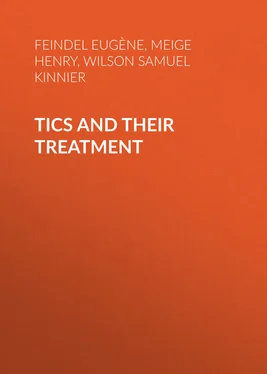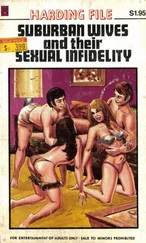Henry Meige - Tics and Their Treatment
Здесь есть возможность читать онлайн «Henry Meige - Tics and Their Treatment» — ознакомительный отрывок электронной книги совершенно бесплатно, а после прочтения отрывка купить полную версию. В некоторых случаях можно слушать аудио, скачать через торрент в формате fb2 и присутствует краткое содержание. Жанр: Здоровье, Медицина, foreign_antique, foreign_language, на английском языке. Описание произведения, (предисловие) а так же отзывы посетителей доступны на портале библиотеки ЛибКат.
- Название:Tics and Their Treatment
- Автор:
- Жанр:
- Год:неизвестен
- ISBN:нет данных
- Рейтинг книги:4 / 5. Голосов: 1
-
Избранное:Добавить в избранное
- Отзывы:
-
Ваша оценка:
- 80
- 1
- 2
- 3
- 4
- 5
Tics and Their Treatment: краткое содержание, описание и аннотация
Предлагаем к чтению аннотацию, описание, краткое содержание или предисловие (зависит от того, что написал сам автор книги «Tics and Their Treatment»). Если вы не нашли необходимую информацию о книге — напишите в комментариях, мы постараемся отыскать её.
Tics and Their Treatment — читать онлайн ознакомительный отрывок
Ниже представлен текст книги, разбитый по страницам. Система сохранения места последней прочитанной страницы, позволяет с удобством читать онлайн бесплатно книгу «Tics and Their Treatment», без необходимости каждый раз заново искать на чём Вы остановились. Поставьте закладку, и сможете в любой момент перейти на страницу, на которой закончили чтение.
Интервал:
Закладка:
In my fifteenth year I was at school with two boys whose hair was rather long, and who had acquired the habit of tossing it back by an abrupt shake of the head. It is true I cannot recollect endeavouring to ape this, but in any case it was at the same time that I found myself exhibiting an identical gesture, and I have little doubt it is the source of one of the tics from which I suffer at present.
I enlisted at the commencement of hostilities in 1870, and had already begun my military instruction, when a personal review of the company was made by a new colonel. As he passed he came to a sudden halt before me, and proceeded to harangue me on my far from military bearing; but his invective had no other effect than to aggravate my facial contortions, and the affair might have proved serious enough for me had not my captain come to the rescue and explained the involuntary nature of the spasms. The colonel, however, would have none of them and after a fortnight's sojourn in hospital I was discharged for "choreic movements of the face."
O.'s tics were at the first confined to the eyes and lips, but others were not long in appearing. He happened to be out one day for a walk with his sister during a snowstorm, and a flake entering his nostril made him sneeze and sniff half a dozen times. Long after the snow had ceased falling and the tickling sensation had vanished he repeated the performance, till it passed into a sniffing tic that continued for some months. His sister thoughtlessly set herself to mimic him, and speedily evolved an identical tic, which still persists.
In their turn, neck and shoulders were implicated in the affection. The most inveterate of all his tics is a somewhat complex twist of the head, whereby the occiput is depressed jerkily, and the chin advanced and elevated, occasionally to the right, though more commonly to the left. Such is the clonic form of the tic, at once frequent and obvious; but it may assume a tonic form, distinguished by an almost permanent retrocollic displacement of the head, the chin being carried in the air.
If, now, we approach these tics in greater detail, we notice, first of all, a blinking tic, more marked on the left side. Apart from abrupt and intermittent contractions of the orbicularis, which close the eye completely and wrinkle the skin in the neighbourhood, the same muscle sometimes passes into a state of tonic contraction, whereby the eye remains only half open, while the rest of the face is in repose, and so continues for a minute or more. Frontal and eyebrow tics also are frequently to be remarked.
Of his own accord O. has supplied us with a pathogenic and etiological analysis of these tics, which for accuracy and insight is truly astonishing.
A large number of my head and face movements owe their origin to the annoyance caused me by my seeing the tip of my nose or of my moustache from time to time. The former organ appears to make a sort of screen in front of me, to avoid which I turn or raise my head: I can now see the object I am facing, but at the same time, naturally, I see my nose again at the side, whence one more tilt of the head, and so on. I am well enough aware how nonsensical all this is; but it fails to deter me from my desire of playing at hide-and-seek with my nose. It is for an identical reason that each moment finds me blinking one eye or the other, or both; I wish, and yet I do not wish, to see my nose, and so I bring my hand up to cover my face. Vain delusion! for if I conceal my nose thus, it is my hand I see next, and I escape from Scylla to fall into Charybdis!
Here, then, is a tic springing from an ordinary visual impression. Any one can see the point of his nose if he wishes, but it does not come in his way should he be looking at something else; whereas our patient divides his attention between the end of his nose and the object of his regard, and his volatile will passes lightly from one to the other, incapable of concentrating itself on either. Force of repetition changes the voluntary act into an automatic habit, the initial motive for which is soon lost; and the patient shows the weakness of his character by making little or no effort at inhibition.
Resort to a pince-nez, in view of advancing age, has contributed materially to the elaboration of a host of absurd jerky movements, from which more tics have been recruited.
No sooner have I put on my pince-nez than I long to alter its position in innumerable ways. I must needs push it down or raise it up, must set it farther on or farther off; sometimes I tax my ingenuity in attempts to displace it by tossing my head. Instead of looking tranquilly through the glasses, my eye is continually attracted by the rim, some point on which I try to focus or to get into a line with the object at which I am gazing. I want to see the object and the pince-nez at the same time; as soon as I no longer see the former I wish to see it again, and similarly with the latter. My tics upset my pince-nez, and I have to invent another tic to get it back into place. The absurdity of this vicious circle does not escape my observation, and I know I am its author, yet that cannot prevent my becoming its victim.
When the pince-nez is not in use I toy with the spring or with the cord, and a day seldom passes without my breaking the one or the other. As I wear spectacles at home one might suppose their relative stability would check my tricks; but their pressure on my temples and ears only serves to provoke fresh movements in a search for comfort.
And so the thing goes on. I was perfectly well aware of it at first, and was wont to imagine it was remediable; eventually, however, these grimaces of mine took place without any attention on my part, and then in spite of it, and I was no longer their master. There seem to be two persons in me: the one that tics, the son of the one that does not, is an enfant terrible , a source of great anxiety to his parent, who becomes a slave to his caprices. I am at once the actor and the spectator; and the worst of it is, the exuberance of the one is not to be thwarted by the just recriminations of the other.
In his accidental discovery of a "crack" in his neck originated other tics. As a matter of fact, these "cracks" do exist, and can be heard at a little distance; but it always requires a brisk toss of the head to elicit them. This is O.'s account of their evolution:
One day as I was moving my head about I felt a "crack" in my neck, and forthwith concluded I had dislocated something. It was my concern, thereafter, to twist my head in a thousand different ways, and with ever-increasing violence, until at length the rediscovery of the sensation afforded me a genuine sense of satisfaction, speedily clouded by the fear of having done myself some harm. The painlessness of the "crack" induced me to go through the same performance many and many a time, and on each occasion my feeling of contentment was tinged with regret: even to-day, notwithstanding that I ought to be persuaded of the harmlessness of the occurrence and the inanity of the manœuvre, I cannot withstand the allurement or banish the sentiment of unrest.
One could not desire a more lucid exposition of the pathogeny of so many of these head-tossing tics. The fundamental importance of the psychical element that precedes the motor reaction, with the secondary psychical reaction in its turn, the impulse to seek a familiar sensation, and the illogical interpretation of it under the influence of a tendency to nosophobia, are all admirably illustrated in O.'s description.
In addition to such "cracks" as are perceptible to others, O. is conscious of various bizarre subjective sensations that he refers to the same region – "bruised," "dragging," "crackling" feelings, not at all dolorous, to which he devotes an inordinate share of his attention. There is nothing abnormal about these, of course; not only may we notice them in ourselves, but, with a little effort, we may even reproduce them. Our indifference to their presence is the exact opposite of the interest they arouse in the patient's mind; his fickle will is, for no adequate motive, concentrated on a commonplace event, and on this slender basis delusions are fostered and tics are shaped.
Читать дальшеИнтервал:
Закладка:
Похожие книги на «Tics and Their Treatment»
Представляем Вашему вниманию похожие книги на «Tics and Their Treatment» списком для выбора. Мы отобрали схожую по названию и смыслу литературу в надежде предоставить читателям больше вариантов отыскать новые, интересные, ещё непрочитанные произведения.
Обсуждение, отзывы о книге «Tics and Their Treatment» и просто собственные мнения читателей. Оставьте ваши комментарии, напишите, что Вы думаете о произведении, его смысле или главных героях. Укажите что конкретно понравилось, а что нет, и почему Вы так считаете.












